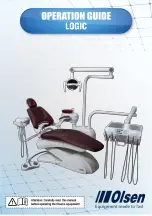
Playground Equipment Maintenance Guidelines
Page 4 of 13
Safety Surfacing (Continued)
Climate, supervision, budget, and maintenance considerations can each be a factor for choosing the
correct material for your site. Safety surfacing materials must be maintained at a depth or thickness
sufficient to meet ASTM Standard F-1292, "Standard Specification for lmpact Attenuation Systems Under
and Around Playground Equipment." This standard provides criteria for measuring the force absorbed by
a playground surface when an object falls on it from a specified height.
lf you select a loose-fill safety surfacing, be sure that the retaining walls or walkways are properly
designed to keep the material in place and at the recommended depth. To avoid creating a tripping
hazard, edging material should be made obviously visible to the user. Be aware that potholes at the base
of slides and under swings may need to be filled on a daily basis.
Use Zones
The CPSC Handbook states that an appropriately wide and unobstructed safety perimeter, covered with
forgiving material, must always surround all play equipment. The guidelines generally recommend a
minimum six-foot fall zone around all sides of the equipment. Review your plans carefully. Be sure your
site's fall zone is adequate; if in doubt, err on the side of safety. Eight to ten feet of unobstructed space
between the equipment and the playground perimeter may not be excessive around high decks or moving
equipment. Allow additional space around "to-fro" swings and such other accessories as Bouncers, Track
Rides, Arch Climbers, and any equipment from which children might be tempted to leap. Swings and
other stand-alone pieces should be installed away from primary traffic patterns. If your playground
includes smaller-scaled equipment for preschool play, locate this equipment at a sufficient distance from
the older children's play area to minimize potential social conflicts.
Concrete Footings
Verify that concrete footings are poured in such a way that they will not become exposed. All concrete
footings should be a minimum of six inches below construction grade, and twelve to eighteen inches
below the top of any loose safety surfacing material. Seek expert advice on footing designs, particularly if
you are building the playground at a site affected by expansive or poor soil conditions, or by climatic
extremes. For instance, in cold climates, footings must extend below the frost line to prevent the soil from
heaving or twisting the structure.
Soil Drainage
Confirm the soil's drainage capacity. Sites with a history of drainage problems may require the installation
of dry wells, French drains or leach lines.
Another option is to build the structure above grade (with low retaining walls containing the safety
surfacing material) to ensure maximum drainage. To aid drainage and reduce the settlement of loose
surfacing material, many playgrounds are installed over a construction grade base of compacted washed
gravel laid beneath filter fabric and the safety surfacing.
Other Site Considerations
WARNING!
Metal playing surfaces can become dangerously hot when exposed to direct
sunlight. Owners/operators must warm users that serious thermal bums may result when bare
skin comes in contact with hot metal.
Track the sun’s path over the apparatus in all seasons and keep in mind that hot metal surfaces are
known to cause thermal bums in hot climates. Generally, in North America, to avoid the direct rays of the
afternoon sun, orient non-shaded metal surfaces toward the North or East.
While a shaded playground is often desirable, always check the site for overhanging tree limbs that might
invite climbing. Prune all dead wood out of the trees located in the vicinity of the playground.
Summary of Contents for Farm Sound Panel Insert R5
Page 17: ......
Page 31: ......
Page 35: ......
Page 47: ......
Page 48: ......
Page 49: ......
Page 55: ......
Page 59: ......
Page 63: ......
Page 71: ......
Page 75: ......
Page 79: ......
Page 101: ......
Page 113: ......
Page 119: ......
Page 139: ......
Page 143: ......
Page 145: ......
Page 159: ......
Page 171: ......
Page 179: ......
Page 183: ......
Page 184: ......
Page 185: ......
Page 191: ......
Page 197: ......
Page 207: ......
Page 211: ......
Page 217: ......
Page 221: ......
Page 227: ......
Page 235: ......
Page 239: ......
Page 243: ......
Page 263: ......
Page 297: ......
Page 301: ......
Page 314: ...Playground Equipment Maintenance Guidelines Page 13 of 13 NOTES...










































